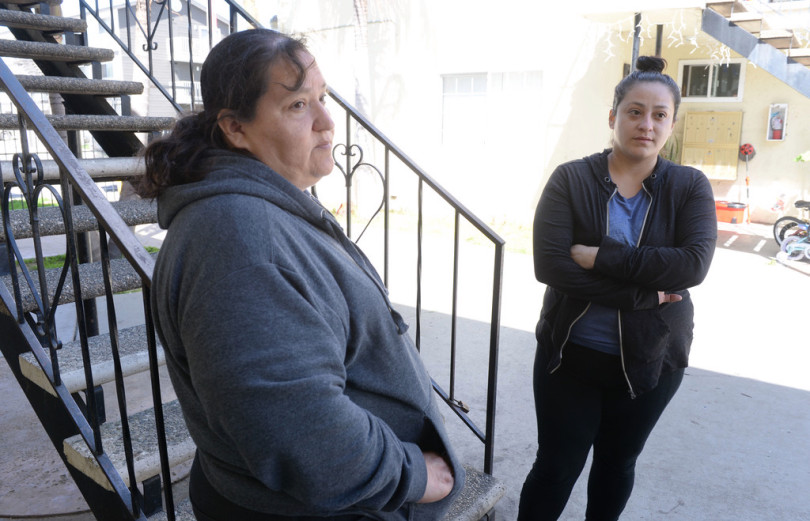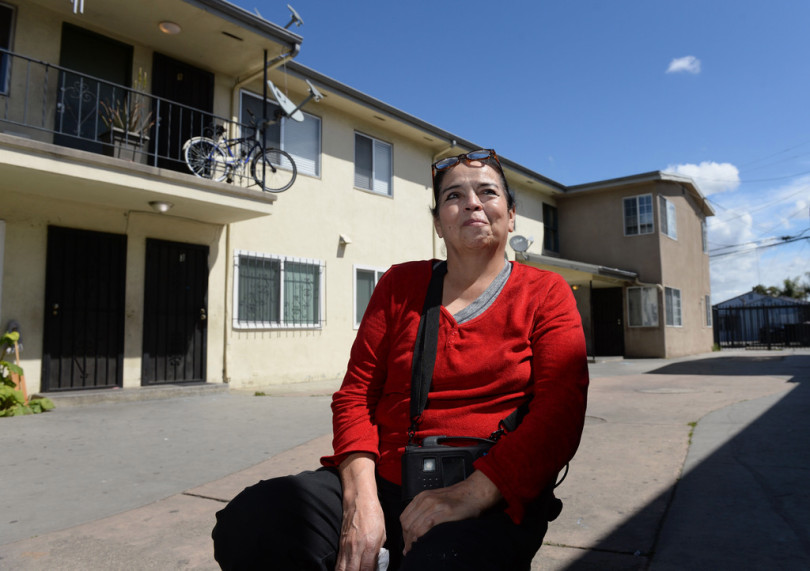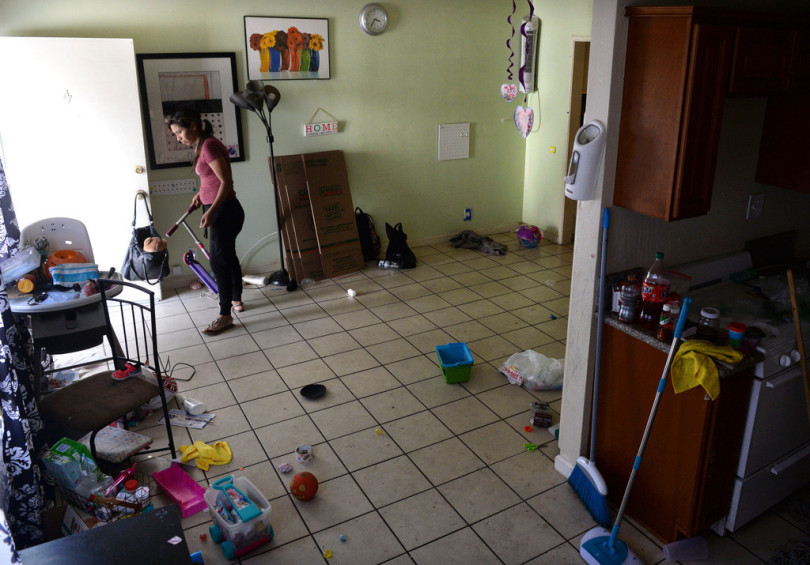The new ordinance has set off a debate about how best to help renters, often living paycheck to paycheck, afford moves when forced out by landlords seeking to renovate apartment complexes.
Wedged between rows of variegated single-family homes, on Alamitos Avenue, sits a dual-property apartment complex. The exteriors of 900 and 904 Alamitos Ave. are beige, or maybe a cream-yellow – shaded, perhaps, by grime, and made illusory by patchwork touch-ups.
Steel blue trim adds spot color. Desert-hued brick – synthetic, akin to textured wallpaper – borders the bottom.
A wrought-iron fence and a concrete courtyard connect the two properties.
This, on the second floor, is where the Pineda family lives. Their apartment, with its single bedroom, is smaller, in total area, than a Metro platform.
An unmade bed occupies much of the living room. A love seat is the only place to entertain guests. There’s a dresser, on which sits a television; an electric fan; and plastic bins, filing cabinets and towers of boxes.

Alma Flores,left, and her daughter Gabby Flores in the courtyard of their apartment complex. Residents said they received notices to vacate their units at the Long Beach complex.
Photo by Stephen Carr
An aquarium, filled with fish, rests in the corner closest to the front door.
This is where Odila Pineda, 59, and her husband sleep. Their teenage children – a daughter, 19, and 16-year-old twin boys – get the bedroom.
The Pinedas pay $925 a month. Since 2013, the apartment has been home.
But Tuesday, July 30, could be the last day the family can say that.
In March, the Pinedas and their neighbors at the 20-unit, 14,000-square-foot apartment complex received 60-day notices to vacate their apartments. Current and former residents said the new property owners and property management company told them they have plans to renovate the complex.
A representative for Pan American Properties, the property management company for 900 and 904 Alamitos Ave., declined to comment on the notices to vacate and the renovation. That representative also declined comment on behalf of the company that owns the property, which did not return multiple calls and emails.

Carlos and Elma Quintanilla live with their three children in a two bedroom apartment at 900 Alamitos Boulevard. Residents said they received notices to vacate their units at the Long Beach complex.
Photo by Stephen Carr
But the Pinedas, and four other families, blew past the 60-day deadline to move, said Maria Lopez, executive director for Housing Long Beach, a tenants-advocacy group. Lopez, who has worked with the residents of the apartment complex to secure financial assistance to move, said the tenants stayed because they had nowhere else to go.
The impasse, however, may soon be over: The Pinedas, and the other families, have an offer from the landlord that will give them $4,500 to leave by the end of the month, Lopez said.
Still, the residents there, far from alone, are illustrative of a citywide problem, according to housing advocates.
In recent years, those advocates say, a number of Long Beach renters have found themselves kicked out of their apartments – with two months to find a new place – through no fault of their own.
Long Beach does not yet track no-fault evictions. But sales of apartment buildings – an indicator, housing advocates say, of massive renovation projects requiring tenants to leave – have spiked recently.

Benigna Gonzalez,71, has lived at an apartment at 904 Alamitos Boulevard for the past 38 years. Residents said they received notices to vacate their units at the Long Beach complex.
Photo by Stephen Carr
In 2017, the most recent year for which data is available, 358 apartment buildings sold, up from 98 in 2012, a 277% increase.
And major rehabilitations are also on the rise, with the city issuing 1,668 permits for apartment buildings in 2017, a 117% increase from five years prior, according to a 222-page report, which the city released in March, that provides a snapshot of Long Beach’s rental market.
“This indicates an especially active market for acquisitions of multi-family residential rental properties in the City of Long Beach,” the report said. “While much of Long Beach’s housing stock, particularly in Class C properties, needs updating and rehabilitation, these types of substantial rehabilitations would not occur without an increase in future rents to offset the cost of the rehabilitation.”
But still, property-owners say, in a city with older housing stock, apartment rehabs are necessary to maintain a safe and healthy living environment for Long Beach residents.

Elma Quintanilla moves her families belongings out of their two bedroom apartment, at 900 Alamitos Boulevard. Residents said they received notices to vacate their units at the Long Beach complex.
Photo by Stephen Carr
The properties at 900 and 904 Alamitos Ave., both built in 1961, are no exception.
Fred Sutton, a spokesman for the California Apartment Association, said housing providers themselves would like to avoid kicking out tenants for the sake of an upgrade, but sometimes that’s not possible.
“I wish these apartments were built to last like the pyramids,” Sutton said, “but unfortunately, they’re not. Things age.”
But, good intentions aside, receiving a 60-day notice can still throw a renter’s life into turmoil.

Elma Quintanilla moves her families belongings out of their two bedroom apartment, at 900 Alamitos Boulevard. Residents said they received notices to vacate their units at the Long Beach complex.
Photo by Stephen Carr
With a 3.8% vacancy rate and steadily increasing rents, advocates say, the results of Long Beach’s booming housing market include too many families forced to relocate, often without the means to do so and not enough places within their budgets.
“There are various tenants currently right now in this position,” Lopez said.
They need “relocation assistance,” she added, “and would benefit from it.”
City officials are well aware of that — and, in fact, have taken steps to ensure tenants have help.
Relocation assistance
The complex at 900 and 904 Alamitos Ave. is nearly empty.
Most of the Pineda family’s neighbors have moved. Boards cover the windows. Padlocks secure the doors.
But for the Pinedas, and a few other families, that’s not an option. They remain.
They can’t afford to leave.
“The cost of living now is very expensive,” said Alma Flores, 45, one of the Pinedas’ neighbors who have been unable to find a new place. “A lot of places, they want you to pay first month, the deposit and another month’s rent. That’s tough on everybody.”

Carlos and Elma Quintanilla take a moment to discuss their options as they move the families belongings out of their two bedroom apartment, at 900 Alamitos Boulevard. Residents said they received notices to vacate their units at the Long Beach complex.
Photo by Stephen Carr
The city, though, has a plan – albeit one fraught with controversy – to ease the financial burden.
The Long Beach City Council recently passed a law requiring landlords to pay relocation assistance to tenants being displaced without fault or experiencing rent increases of more than 10%.
The ordinance, set to take effect on Thursday, Aug. 1, calls for two months of payment toward relocation costs, based on number of bedrooms, up to $4,500. For a studio, a displaced tenant could receive $2,706 in relocation benefits.
City Councilman Rex Richardson, for his part, was among the council members who voted for the tenant relocation ordinance.
“If you’re a tenant and lived there for years, and someone buys the building and gives a 60-day notice, should they help you land on your feet?” he said. “I think the answer is, ‘Yes.’”
Some tweaks to the ordinance are expected to come before the City Council at some point in the near future — City Attorney Charles Parkin said it’s unclear when — which would include offering property-owners the option to provide renters with 180 days of notice to vacate instead of paying them relocation assistance.
That type of compromise, property owners say, would be a key way to avoid over-burdening landlords who need to make necessary upgrades, which already tend to have a high upfront cost.
“Housing providers are in the business of housing,” Sutton said, “so anytime there’s a vacancy, that’s going to affect the finances for that property.
“Everyone’s goal, when they’re doing these rehabs,” he added, “is to be able to get them into a habitable standard as quickly as possible.”
Although the goal of providing relocation assistance may come from a good place, he said, Long Beach itself should provide the funding if it believes residents are in dire enough straits to need that kind of help.
“For those that are having financial struggles,” he said, “I think it’s really, really incumbent upon local municipalities to have robust Section 8 programs and robust direct-subsidy programs to help individuals bridge any financing that’s needed for the truly needy.”
Other challenges
But regardless of who foots the bill, families like the Pinedas face challenges the relocation ordinance doesn’t address – especially when they weren’t planning to move.
“It’s been hard because for a one-bedroom, they only want four people,” said one of Odila Pineda’s sons, Hever. “If you have a big family, it’s harder to find a place.”
The family wants to stay in Long Beach, primarily because Hever and his twin attend Wilson High. But the family’s maximum budget is $1,750 – and they haven’t found much.
“Little, little rooms, like a closet,” Odila Pineda said. “A lot of money for so little.”
But still, they’ve applied for multiple places.
Which can be costly in its own right.
The city’s relocation ordinance is intended to cover tenants’ first and last month of rent – but that’s it.
The Pinedas, though, have already spent about $100 on application fees.
That’s a heavy expense for a family whose sole income is that of Odila Pineda’s husband, a contract handyman.
And the more places they – and others – strike out on, the higher the total cost for background checks will be. Then there’s the cost of physically moving your personal items.
“Everything is so much higher than what we paid here, and almost in the same condition as this apartment,” said Elma Quintanilla, 25, an four-year resident of the complex at 900 and 904 Alamitos Ave.
She began her apartment search right after receiving the notice to vacate – but still found nothing. So now she, her husband and their three children are staying with a friend to save money.
“It’s just not going easy,” Quintanilla added, “looking for places to stay.”
Tracking no-fault evictions
It’s difficult at the moment, however, to determine how widespread the problem of 60-day notices to vacate is, and how much it affects those who receive them.
The city, after all, can’t track that data. At least not yet.
The new ordinance, though, does require landlords to inform the city when they make relocation payments, said Patrick Ure, Long Beach’s housing and neighborhood services bureau manager.
“That will at least give us some data,” Ure said, “so that we can actually see what’s really occurring out there.”
Tracking that data will also, officials say, allow them to make informed decisions about how to amend the ordinance – a task that is likely.
Ure acknowledged the challenge of crafting this ordinance, which took input from various stakeholders, including housing and property-owner advocates.
“We tried to have something that was balanced,” he said, “that provided some assistance to tenants but also took into consideration the impact on property owners.”
But as the ordinance made its way through the City Council approval process earlier this year, the panel’s members acknowledged that the policy, as written, was imperfect. A slew of changes, they said, needed to be made.
“It’s not where we want it to be,” Councilwoman Suzie Price said during a May 21 meeting. “So I’m not sure why we would vote on an ordinance that we’re all saying is not where it needs to be.”
Some council members, during that meeting, implied the panel’s urgency stemmed from wanting to pass the law before the impending departure of one of their colleagues: State Sen. Lena Gonzalez was, at the time, the District 1 councilwoman and a champion of relocation assistance. But she was also the heavy favorite — and eventual winner — of the June 5 special election for the seat she currently holds in the California legislature.
Gonzalez, for her part, said during the May 21 meeting that she would also like to see tweaks made to better protect renters.
“But,” she added, “I would like to move this forward today.”
A list of changes that different council members requested were scheduled to come before the council on Tuesday, July 23. Those included: requiring landlords to pay renters before they move, rather than after; giving property owners the option to provide 180 days of notice instead of having to dole out the assistance money; and exempting landlords who own two four-unit properties.
But because of an uproar, from renters and landlords alike, on the lack of notice they received — the agenda item was posted late the previous Friday — the council withdrew the item.
It’s unclear when those amendments may come back before the body.
Opponents, meanwhile, say the ordinance as written would financially affect more small property owners than big corporations. Some also said they may be forced to raise rents to fund relocation costs.
At the second reading of the new ordinance, on June 11, Joani Weir of Better Housing for Long Beach described the new law as a form of rent control.
“The real loser is going to be the tenants because they’re the ones that are going to lose their housing,” she said at the time. “Because you pushed policy that isn’t going to keep you in your homes.”
Sutton, from the California Apartment Association, agreed with her.
He said the city and state’s housing affordability crisis is due to a lack of supply — a common refrain among developers and landlords – and pushing more costs onto property owners will not incentivize them to provide more housing.
“Ironically, housing providers — who are continually being bashed — are the answer to the affordability crisis,” Sutton said. “It is housing providers who provide the vast bulk of affordable housing in the city of Long Beach and throughout the state of California.”
Moving on
The tenant relocation ordinance, meanwhile, likely – though far from certainly – won’t help the Pinedas or their neighbors.
The ordinance does not say whether the assistance is retroactive to renters who received 60-day notices before the law goes into effect Thursday.
But Rich Anthony, Long Beach’s deputy city attorney, said his opinion is that it should only apply to those issued the notices after Aug. 1.
Lopez, for her part, disagrees.
“I definitely think it should be retroactive,” she said. “We started asking for that since it first came up.”
Still, Anthony said, it was an oversight not to explicitly lay out to whom the law would apply – one that could end the ordinance in court.
“It’s not something that any of us all kind of thought about or discussed, which we probably should have,” Anthony said. “When you roll out a new regime like this, there’s always something that gets lost in the cracks, and unfortunately, this is one of those things.”
But either way, time is short for the Pinedas and the other families.
In early June, the property owners served the tenants with a legal complaint — what the state terms an unlawful detainer notice — that sought to evict them. Those sorts of complaints, in essence, are a type of lawsuit that asks the government to compel tenants to leave a property; under the law, only a judge can order an eviction – and only a Los Angeles County Sheriff’s deputy can enforce it. So serving the remaining tenants of 900 and 904 Alamitos Ave. the unlawful detainer notice, Lopez said, laid that groundwork for what could have been a protracted court battle.
But the families and the property owners, during that time, also entered negotiations. The tenants rebuffed the first offer, $3,000, because they’d still have to pay rent until they moved. (The tenants, Lopez said, also undertook a rent strike for the unrelated reason that they thought the complex was in ill-repair.)
Then, earlier this month, the owners upped the offer: $4,500 – the cap under the city’s new ordinance – and no rent. The Pinedas, for their part, are still thinking things over, but will likely accept it.
“It’s probably in their best interest to take this deal,” Lopez said.
So they’ll leave.
And the property owners will likely get to work rehabbing 900 and 904 Alamitos Ave.
The Pineda family, meanwhile, still has nowhere else to call home.
The family will likely move in with one of Odila’s sisters. Her place, while not spacious, will give the Pinedas more time to find a new residence.
One day, in late June, Hever Pineda discussed the prospect. His mom’s beans, cooking on the stove, overwhelmed the tiny apartment. At his aunt’s place, he may not even have a shared bedroom to which he could escape.
He shrugged.
“I’ll sleep on the floor.”
Long Beach Media Collaborative members Don Jergler and Stephen Carr, and staff writer Chris Haire contributed to this report.


Comments are closed.